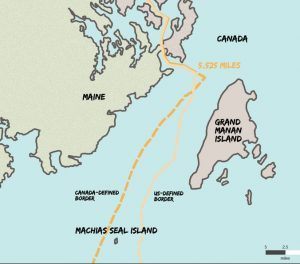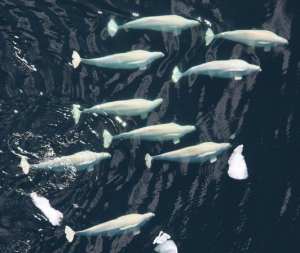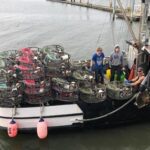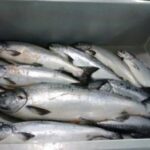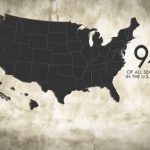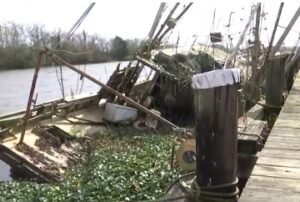Tag Archives: canada
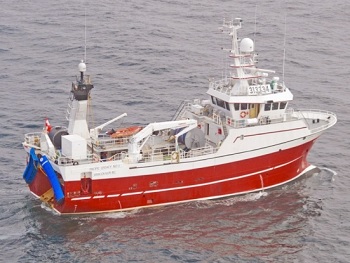
International Scientific Expedition to probe Pacific salmon survival
“While we recognize that ocean and climate conditions are major factors regulating salmon abundances, the mechanisms regulating abundances in the ocean are not known,” B.C. scientists Richard Beamish and Brian Riddell,, Scientists are seeking to provide more accurate forecasts of salmon returns during what Beamish and Riddell say might be the most difficult time in recent history for stewardship of Pacific salmon.,, The survey takes place as B.C. fishermen fear disastrous returns this year following poor returns for much of the coast last year. >click to read< 18:56
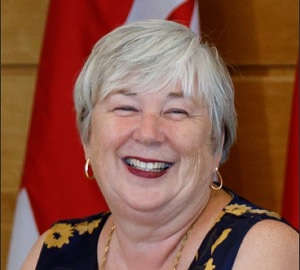
Further protection measures coming to protect North Atlantic right whales
Federal Fisheries Minister Bernadette Jordan says Ottawa will announce further measures in the coming weeks to protect the endangered North Atlantic right whale. Speaking to a fishing gear innovation summit in Halifax today, Jordan didn’t release any details of the coming measures.,, The minister says testing also continues on new technology such as ropeless gear, which could help reduce the risk of entanglements for whales. More than 250 harvesters and fishing gear manufacturers from Canada, the United States, Iceland and Norway are attending the two-day summit. >click to read< 12:50
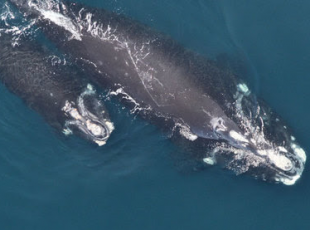
The Risk of Ship Strikes: Maine Congressional Delegation Ask Feds To Shift Focus Of Right Whale Protections
In a letter to top officials at the National Oceanic and Atmospheric Administration (NOAA) this week, the delegation calls on the agency to provide more information about reducing the risk of ship strikes off the United States and Canada – strikes that they say are as much a threat to the whales’ survival as entanglement with lobster fishing gear. >click to read< 10:13
 Most likely Carnival Cruise Lines is responsible for 18+ Right Whale deaths in the past 3 year, at which rate they would soon be extinct – >click to read<
Most likely Carnival Cruise Lines is responsible for 18+ Right Whale deaths in the past 3 year, at which rate they would soon be extinct – >click to read<
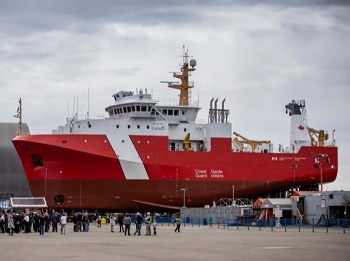
Rising costs drain contingency fund for Canada’s new fisheries science ships
According to a memorandum prepared for Jonathan Wilkinson, the former minister of fisheries and oceans, the project had already used $19 million in contingency funds by May 2019. But more was needed, the memo said, to cover “escalating project costs such as labour rates and owner’s changes, as well as other unexpected increases to project costs including transition into service costs.” “Access to the remainder of the contingency funding [redacted] is now required,” the two-page memo said. >click to read< 10:21

Canada: Government conflict of interest a threat to fish biodiversity: scientists
Canada has made disappointingly little progress in preserving the variety of life in its oceans largely because of a contradiction in the federal department that’s supposed to protect it, says a group of senior scientists. “The (Department of Fisheries and Oceans) is charged with conflicting responsibilities,” said Jeff Hutchings, a marine biologist at Dalhousie University in Nova Scotia. “On the one hand, they’re there to protect and conserve. On the other hand, they are charged with the responsibility of exploiting fish stocks.” >click to read< 08:40

‘Find some good solutions’: governments, experts, fishermen prepare for 2020 right whale regulations
An annual roundtable meeting held by officials with the Department of Fisheries and Oceans has wrapped up after discussing how to deal with the declining North Atlantic right whale population. The subject has become controversial after at least nine confirmed deaths in 2019, with several preliminary findings indicating vessel strikes were the cause. Some of the deaths came despite the Canadian government cracking down tighter on fisheries closures and speed restrictions, but the impact on the fishing industry is part of what makes regulations such a controversial topic. >click to read< 08:43
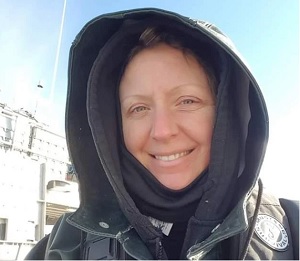
The Women Doing Canada’s Most Dangerous Job: Fishing
“The first two captains I asked for employment—one was a family friend and the other my uncle—told me no when I asked for a job,” Fleet said. “As I’d never done it before, I didn’t exactly know what the risks and dangers were.” At the time, Fleet knew of only one woman who worked on a lobster boat, out of an estimated 1,500 Grand Manan residents in the industry. The only position she found was available because few others wanted to take it. Notorious for being reckless and hard to work with, the captain had lost two of his crewmen overboard the previous spring, though he was able to retrieve them safely. When she heard Fleet would be working with him, Fleet’s mother cried. >click to read< 21:01

Slow response to right whale plight could have impact on Canadian fisheries
Fishermen off the U.S. east coast have confronted tight restrictions on fishing gear and vessel pace restrictions to make sure their actions don’t hurt marine mammals, together with the endangered North Atlantic proper whale. However in Canada, it was solely after proper whales started turning up lifeless in giant numbers in 2017, lots of them tangled in fishing gear and struck by vessels, that authorities introduced in emergency measures, and by then it was too late to keep away from a file variety of deaths.,,, (Sean) Brillant stated the USA legislated in 2016 >click to read< to forestall the entry into the nation of seafood that doesn’t meet strict requirements across the incidental killing of different species, together with whales. >click to read< 07:47
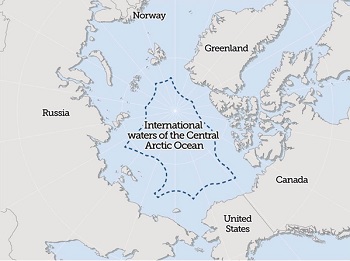
U.S. ratifies The Agreement to Prevent Unregulated High Seas Fisheries in the Central Arctic Ocean
The United States has become the fourth jurisdiction after Canada, the European Union and Russia to ratify a landmark international agreement that aims to prevent unregulated commercial fishery in the high seas of the Central Arctic Ocean, officials at the State Department announced Tuesday. The Agreement to Prevent Unregulated High Seas Fisheries in the Central Arctic Ocean, which was signed in Ilulissat, Greenland last October, includes the so-called Arctic Five – Canada, Norway, Russia, Denmark (Greenland and the Faroe Islands), the U.S. – as well as the major fishing nations – Iceland, Japan, South Korea, China and the EU. >click to read< 17:56

Lobstermen at NOAA meeting oppose new fishing regulations
The Ellsworth High School auditorium was packed during one of a series of meetings held near fishing communities in Maine. The crowd was made up of conservationists, scientists and politicians, but mostly fishermen. U.S. Sen. Angus King, I-Maine, and State Rep. Genevieve McDonald, D-Deer Isle, attended the event, while Sen. Susan Collins, R-Maine, and U.S. Rep. Jared Golden, D-2nd Dist., sent staff representatives.,, NOAA research indicates that large vessel strikes are the predominant cause of whale deaths.“If you would just give us a chance to prove our innocence,” one person said. >click to read< 20:11
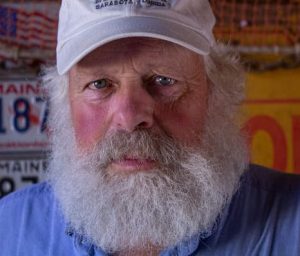
Maine fishing practices at center of debate about endangered right whale
Hutchings thinks the looming regulations to save the right whale, an endangered species, are only part of the problem with the industry. National Oceanic and Atmospheric Administration is proposing the new rules. He would like to continue fishing lobster for a few more years to be able to say he spent 50 years as a fisherman, but said he feels more financial constraints every year. “I’d hate to be a young guy starting out,” Hutchings said. “ … It (NOAA) should be more worried about the fishermen becoming extinct.” >click to read< 11:49
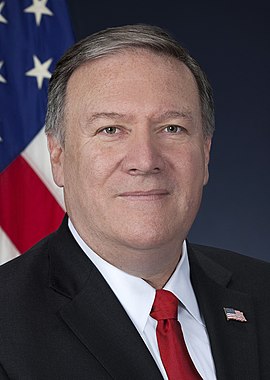
Pompeo calls out Canada, China, Russia over Arctic policy. China entitled to ‘exactly nothing.’
U.S. Secretary of State Mike Pompeo stunned onlookers Monday by taking swipes at Canada, China and Russia in a speech to delegates attending the Arctic Council ministerial. Pompeo, along with foreign ministers from the seven other Arctic nations — Canada, Denmark, Finland, Iceland, Norway, Sweden and Russia — is in Rovaniemi, Finland this week for the eleventh Arctic Council ministerial meeting. Pompeo used his speech to call out countries he accused of making illegitimate claims to Arctic territory, citing Canada’s claim to the Northwest Passage as internal waters. The U.S. considers the Northwest Passage to be international waters. >click to read<09:57
US climate objections sink Arctic Council accord in Finland – click to read<10:39
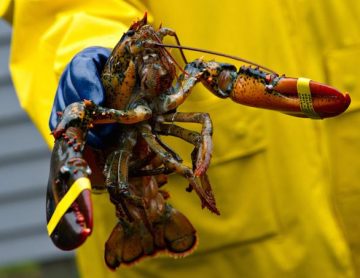
Daunting task begins: Reducing lobster gear to save whales
The interstate Atlantic States Marine Fisheries Commission met Monday outside Washington to discuss the implementation of the new rules, which are designed to reduce serious injuries and deaths among whales by 60 percent.,,, The interstate Atlantic States Marine Fisheries Commission met Monday outside Washington to discuss the implementation of the new rules,,,, Colleen Coogan, who coordinates the federal government team designed to protect the whales, said during the meeting that cooperating with Canadian authorities is also going to be very important. “We’ve set a pretty high bar,” Coogan said. “They’re going to have to show that their measures provide similar protections to right whales.” >click to read<08:58
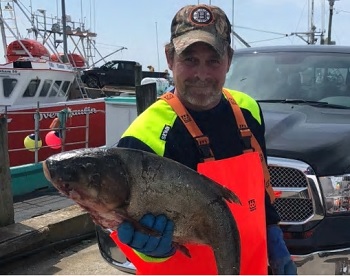
Canada closer to allowing Asian carp as lobster bait, depending on test outcomes
The Canadian Food Inspection Agency says it is prepared to accept invasive Asian carp from the United States as bait for the lobster industry, provided U.S. authorities can meet a number of conditions including proof the carcasses pose no disease threat. “If the U.S. can meet these requirements, Canada is willing to accept the import of dead, eviscerated silver carp for use as bait,” CFIA spokesperson Brian Naud said in a statement. There is interest in both countries in using Asian carp to supply their respective lobster fisheries which are experiencing a bait shortage as traditional sources decline: herring in the United States and mackerel in Canada. The state of Maine is poised to make a decision on Asian carp as a bait source by the end of May. >click to read<11:34
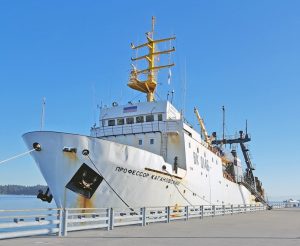
International team of salmon scientists back in port, raring for another mission
The organizer of a month-long Gulf of Alaska salmon survey is already thinking about how to raise money for another trip in the winter of 2020, now that the Russian trawler used in the expedition has finished its job and tied up in Nanaimo. “From what I’ve seen, this needs to be done again,” said Richard Beamish, who came up with the idea of the expedition to mark the International Year of the Salmon with the North Pacific Anadromous Fish Commission. Future surveys would build on data collected by the 21-member volunteer team of international scientists from the five salmon-producing Pacific Rim countries: Canada, Russia, the U.S., Korea and Japan. >click to read<11:52
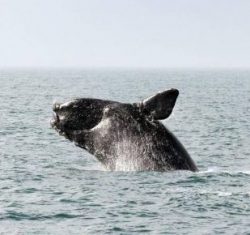
U.S. Marine Mammal Protection Act regulations could impact Canadian fishers
While there were no active harvesters at the Department of Fisheries and Oceans (DFO) public meeting on Thursday, Feb. 28, at the Clarenville Inn, the resource managers still discussed two topics which will affect fishers in the future — the United States’ marine mammal protection act and potential fishery monitoring policies. DFO resource manager Jackie Kean explained the United States Marine Mammal Protection Act is nothing new, it’s been around since the 1970s. However, DFO made clear that all countries who export to the U.S.A. must meet their requirements for marine mammal bycatch while fishing various species in local waters. >click to read<18:33
B.C.-led international expedition to probe ailing Pacific salmon stocks
An unprecedented international collaboration could revolutionize salmon science and fisheries management, return forecasting and even hatchery output. Nineteen scientists from Russia, Canada, the United States, Japan and South Korea are set to probe the secret lives of five Pacific salmon species with a four-week grid search and test fishery across the Gulf of Alaska. The expedition begins next week aboard the Russian research ship MV Professor Kaganovsky. “We know virtually nothing about what happens to salmon once they leave near-shore waters in the Salish Sea,” said expedition organizer Dick Beamish. >click to read<13:56
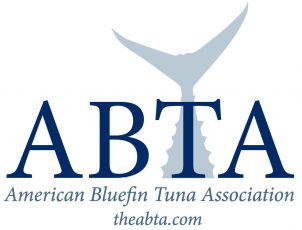
ICCAT Meeting Ends After ‘Spectacular Failure’ to Protect Bigeye Tuna
The International Commission for the Conservation of Atlantic Tunas (ICCAT) concluded its annual plenary meeting on November 19 after a spectacular failure to arrive to a comprehensive agreement on badly needed management measures to address the present poor state of Atlantic bigeye tuna stock. Bigeye tuna is highly coveted by sashimi markets worldwide, similar to bluefin tuna. ICCAT’s eight-day meeting, held this year in Dubrovnik, Croatia, was attended by over 700 people representing 52 countries. The U.S., Canada, South Africa and a handful of other nations strongly advocated for the adoption of measures that would end overfishing immediately and rebuild the stock within 10 years. However, >click to read<20:21
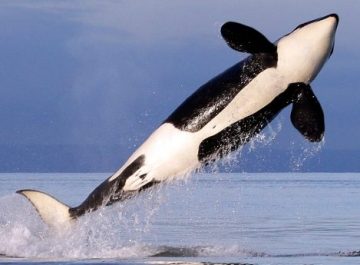
$1.5 billion Oceans Protection Plan – Canada takes immediate action to protect endangered whales
Today, Canada’s Whales Initiative was announced in Vancouver by the Honourable Marc Garneau, Minister of Transport, and Jonathan Wilkinson, Parliamentary Secretary to the Minister of Environment and Climate Change. This $167.4 million initiative under Budget 2018 will protect and support the recovery of the Southern Resident Killer Whale, the North Atlantic right whale, and the St. Lawrence Estuary beluga whale through comprehensive actions tailored to address the unique combinations of threats. >click to read<13:02

Federal carbon tax could ‘degrade’ Canadian fishing industry’s competitiveness
The federal government’s carbon tax could take a toll on Canada’s fishing industry, causing its competitiveness to “degrade relative to other nations,” according to an analysis from the fisheries department.,, According to the analysis, the fishing sector would need to absorb annual fuel cost increases of 2.1 per cent, or $5.2 million, under a carbon price that increases by $10 per tonne annually to $50 per tonne in 2022. The commercial fishing sector would be hardest hit, it finds, as fuel costs account for more than nine per cent of production costs. >click to read<
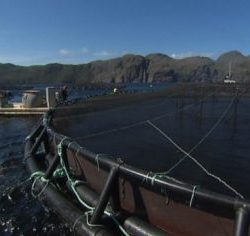
Audit finds Canada’s federal government fumbling on fish farms
The federal government is fumbling the management of fish farms, while failing to enforce rules and manage risks of infectious diseases, parasites, drugs and pesticides that cause damage to wild fish, says a scathing audit released on Tuesday. The audit was one of three reports tabled on Tuesday in the House of Commons by Julie Gelfand, Canada’s commissioner of the environment and sustainable development. It sounds alarms about Canada’s fish farms on Canada’s coasts while questioning the effectiveness of about $30 million in annual government spending to oversee the $1-billion industry. >click to read<11:47
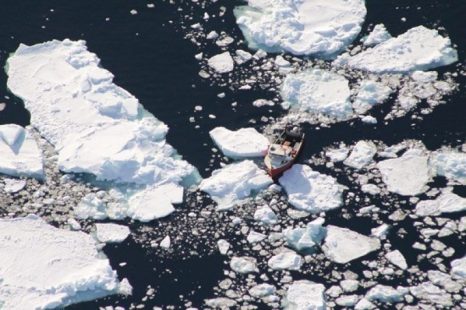
The hunt Canada loves: Why seal clubbing will never die (It’s more humane than most opponents think)
It’s sealing season once again in Canada. This means that, once again, activists are out in strength to decry Canadians as baby-killers and, in some cases, ISIS. And on Tuesday, Canada’s strained relationship with India got just a bit worse when India banned the import of seal skins (although, for obvious reasons, they were never a major seal skin market). Below, a quick guide to the one of the world’s most embattled hunts. What’s true, what’s a myth and why Canadians will never, ever stop doing this. >click to read<09:18
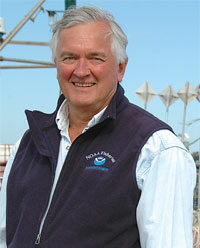
John Bullard: Lobster industry must lead on right whales
A NUMBER OF EVENTS over the past two weeks have probably gotten the full attention of the US lobster industry and increased pressure for it to take the lead in fighting the potential extinction of the North Atlantic right whale. In response to the deaths of the endangered whale, including 12 in Canada last year, Canada has imposed new restrictions on ship speeds and snow crab fishing, as well as earmarked $1 million more annually to help free marine mammals from fishing gear. >click to read<12:03

Right whale deaths spur regulators to eye fishing gear modifications
This has been a tough year for North Atlantic right whales. Late in October, according to the International Fund for Animal Welfare, the badly decomposed carcass of a right whale was found ashore on Nashawena Island, south of Cape Cod in Massachusetts. It was the 16th of the highly endangered species known to have died in U.S. or Canadian waters in 2017. Starting in the early spring and continuing through the late summer months, a dozen dead right whales were found floating in Canada’s Gulf of St. Lawrence.,,, Last year, the NOAA Fisheries Large Whale Take Reduction Team (TRT) began a five-year review click here to read the story 08:23
Enviro Groups Demand U.S., Canada Act to Save North Atlantic Right Whales
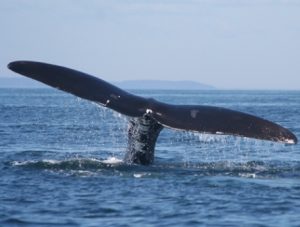 Conservation and animal-protection groups today sought action by the United States and Canada to prevent painful, deadly entanglements in fishing gear that threaten the critically endangered North Atlantic right whale. In letters to Canadian officials and the U.S. National Marine Fisheries Service, the groups demanded action to reduce risks to these imperiled whales. North Atlantic right whales, one of the world’s most endangered mammals with fewer than 500 individual animals remaining on Earth, lost nearly 3 percent of their population this year. click here to read the story 14:00
Conservation and animal-protection groups today sought action by the United States and Canada to prevent painful, deadly entanglements in fishing gear that threaten the critically endangered North Atlantic right whale. In letters to Canadian officials and the U.S. National Marine Fisheries Service, the groups demanded action to reduce risks to these imperiled whales. North Atlantic right whales, one of the world’s most endangered mammals with fewer than 500 individual animals remaining on Earth, lost nearly 3 percent of their population this year. click here to read the story 14:00
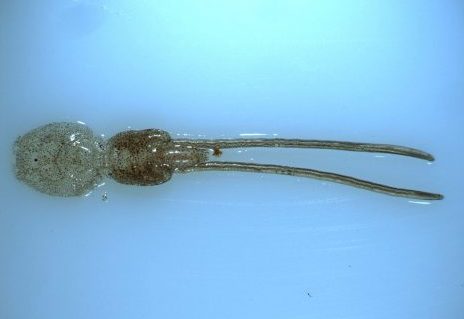
Parasitic sea lice plagues global farmed salmon industry
A surge of parasitic sea lice is disrupting salmon farms around the world. The tiny lice attach themselves to salmon and feed on them, killing or rendering them unsuitable for dinner tables. The lice are actually tiny crustaceans that have infested salmon farms in the U.S., Canada, Scotland, Norway and Chile, major suppliers of the high-protein, heart-healthy fish. Scientists and fish farmers are working on new ways to control the pests, which Fish Farmer Magazine stated last year costs the global aquaculture industry about $1 billion annually. click here to read the story 20:26
King fishery closed
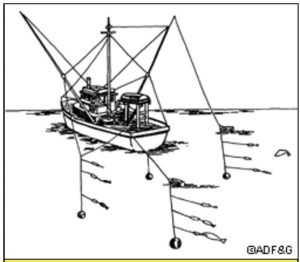 Fisheries managers in Southcentral Alaska might still be wrestling with what to do about a weak return of king salmon to the Copper River, but their counterparts in Southeast Alaska have acted to protect kings returning to the Taku and Stikine Rivers. Officials with the Alaska Department of Fish and Game today announced commercial troll fisheries which catch most of the Southeast kings, or Chinook as they are otherwise called will close at midnight Sunday. Preseason forecasts for wild Chinook salmon production in Southeast Alaska are at an all-time low, a press release said. Typically, in the Taku and Stikine rivers, nearly half the run has entered the river by the end of the third week of May; however, record low numbers of Chinook salmon are being seen in-river this year. The Taku and Stikine are transboundary rivers, and Fish and Game runs research programs with the Department of Fisheries and Oceans Canada to assess in-season run strength. Click here to read the story 13:13
Fisheries managers in Southcentral Alaska might still be wrestling with what to do about a weak return of king salmon to the Copper River, but their counterparts in Southeast Alaska have acted to protect kings returning to the Taku and Stikine Rivers. Officials with the Alaska Department of Fish and Game today announced commercial troll fisheries which catch most of the Southeast kings, or Chinook as they are otherwise called will close at midnight Sunday. Preseason forecasts for wild Chinook salmon production in Southeast Alaska are at an all-time low, a press release said. Typically, in the Taku and Stikine rivers, nearly half the run has entered the river by the end of the third week of May; however, record low numbers of Chinook salmon are being seen in-river this year. The Taku and Stikine are transboundary rivers, and Fish and Game runs research programs with the Department of Fisheries and Oceans Canada to assess in-season run strength. Click here to read the story 13:13
Area of Interest – Canada Identifies Large Ocean Area off the Coast of British Columbia for Protection
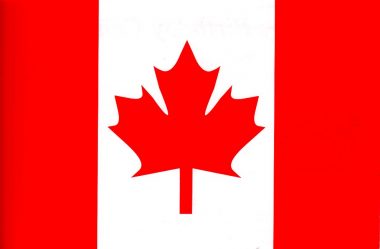 The Government of Canada is moving forward on its plan to reach its domestic and international targets of protecting 5% of Canada’s marine and coastal areas by 2017 and 10% by 2020 to ensure a healthy environment and economy for current and future generations. Today, Parliamentary Secretary to the Minister of Fisheries, Oceans and the Canadian Coast Guard and Member of Parliament for Burnaby North – Seymour, Terry Beech, on the behalf of the Honourable Dominic LeBlanc, Minister of Fisheries, Oceans and the Canadian Coast Guard, announced a new Area of Interest (AOI) off the coast of British Columbia, with the intention of making it one of Canada’s largest Marine Protected Areas (MPAs) by 2020. click here to read the press release 17:09
The Government of Canada is moving forward on its plan to reach its domestic and international targets of protecting 5% of Canada’s marine and coastal areas by 2017 and 10% by 2020 to ensure a healthy environment and economy for current and future generations. Today, Parliamentary Secretary to the Minister of Fisheries, Oceans and the Canadian Coast Guard and Member of Parliament for Burnaby North – Seymour, Terry Beech, on the behalf of the Honourable Dominic LeBlanc, Minister of Fisheries, Oceans and the Canadian Coast Guard, announced a new Area of Interest (AOI) off the coast of British Columbia, with the intention of making it one of Canada’s largest Marine Protected Areas (MPAs) by 2020. click here to read the press release 17:09






